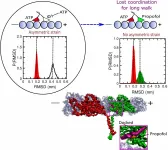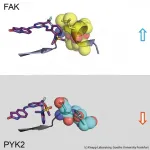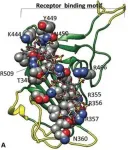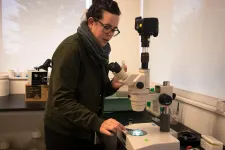(Press-News.org) After analyzing the genomes of more than one-quarter of a million military veterans, a team of scientists, led by researchers at University of California San Diego, Veterans Affairs San Diego Healthcare System (VASDHS), Yale University and West Haven VA, have identified 18 specific, fixed positions on chromosomes (known as loci) that appear associated with post-traumatic stress disorder (PTSD).
The findings validate the underlying biology of PTSD, its relationship to comorbid anxiety and depressive disorders and provide potential new targets for treatment, write the authors in the January 28, 2021 online issue of Nature Genetics.
"We're very intrigued by the findings of this study, for example, as they pertain to the genetic relationships between different kinds of PTSD symptoms," said co-principal investigator Murray Stein, MD, MPH, Distinguished Professor of Psychiatry and Family Medicine and Public Health at UC San Diego School of Medicine and a psychiatrist at VASDHS. "It also shows the huge value of the Million Veteran Program in facilitating research important to the care of our military veterans."
The research team conducted genome-wide association studies (GWAS) of more than 250,000 persons of European and African ancestry participating in the Million Veteran Program. GWAS involve rapidly scanning markers across complete sets of DNA, or genomes, of many people to find genetic variations associated with a particular disease. Launched in 2011, the Million Veteran Program is a U.S. Veteran Affairs-sponsored research effort to learn how genes, lifestyle and military exposures affect health and illness. More than 825,000 U.S. veterans have joined.
The scientists surveyed veterans' electronic health records for diagnosed cases of PTSD and for quantitative symptoms, such as recurrent intrusive memories of traumatic events, severe emotional distress or physical reactions to reminders of traumatic events, self-destructive behaviors and difficulty sleeping.
PTSD is a serious mental disorder that can occur after exposure to extreme, life-threatening stress. It's estimated that half to more than three-quarters of Americans experience traumatic events over a lifetime, but most do not develop PTSD. Lifetime prevalence for PTSD is approximately 7 percent (but much higher among veterans), which suggests people have varying degrees of resilience to stress and vulnerability to the disorder.
Susceptibility to PTSD has long been known to be heritable. Like other mental disorders, it is an extremely complex phenotype, or set of observable characteristics, that is influenced by multiple genes. Indeed, current diagnostic guidelines permit up to 163,120 unique conformations of symptoms for the disorder.
The study directly compared the heritability of diagnostic PTSD cases with continuous, symptom-based phenotypes of PTSD. Though symptoms of PTSD are extremely diverse, their genetic overlap is high -- an important insight into the disorder's underlying biology.
The researchers identified multiple genes that were repeatedly implicated in different PTSD phenotypes, indicating both that the genes were key players in development of the disorder and that they might be suitable targets for therapeutic drugs.
"These findings give us new insights into the biological basis of PTSD," said co-principal investigator Joel Gelernter, MD, professor of psychiatry, genetics and neuroscience at Yale School of Medicine and VA Connecticut Healthcare System, "and point to some possible next steps for testing new treatments."
INFORMATION:
Co-authors of the study include: Daniel F. Levey, Zhongshan Cheng, Frank R. Wendt, Gita A. Pathak, Mathew J. Girgenti, Ronald S. Duman, Renato Polimanti, Mihaela Aslan, Hongyu Zhao, John Concato and Joel Gelernter, all at VA Connecticut Healthcare System and Yale University; Kelly Harrington, VA Boston Healthcare System and Boston University School of Medicine; Kelly Cho, VA Boston Healthcare System and Brigham and Women's Hospital; Rachel Quaden, Yuk-Lam Anne Ho and Daniel Posner, all at VA Boston Healthcare System; and Krishnan Radhakrishnan, VA Boston Healthcare System and University of Kentucky.
3D-printable resins, such as those used in dental applications, are marketed as biocompatible
Clear tooth aligners, a multi-billion-dollar industry, use these resins
Many other consumer products use 3D-printable resins
CHICAGO --- Two commercially available 3D-printable resins, which are marketed as being biocompatible for use in dental applications, readily leach compounds into their surroundings. These compounds can induce severe toxicity in the oocyte, the immature precursor of the egg which can eventually be fertilized, reports a new Northwestern Medicine study in ...
HOUSTON - (Jan. 28, 2021) - Like a wrench that gums up the gears, a common anesthetic keeps the motor proteins in your cells from making their rounds.
This is not necessarily a bad thing, but how it works has been a mystery until now.
Researchers at Rice's Center for Theoretical Biological Physics (CTBP) detail the mechanism that allows propofol -- the general anesthetic injected to knock you out before surgery -- to halt the movement of kinesin proteins that deliver cargoes along microtubules to the far reaches of cells.
The drug's effect on kinesin was known, ...
WACO, Texas (Jan. 28, 2021) - An organization that projects an ethical face but whose managers fail to respond to internal ethical situations sends mixed messages to its employees, which can lead to a lack of employees' moral courage and an increase in unethical behavior, according to a study led by a Baylor University researcher.
The study, "Management Without Morals: Construct Development and Initial Testing of Amoral Management," is published in the journal Human Relations. The research comprises three survey-based studies of 1,034 full- and part-time workers to answer the question of, "What happens when leaders do not respond to the ethical components of business situations?".
"I ...
Washington, DC — Research shows that certain segments of the population who contract SARS-CoV-2, the strain of the virus that causes COVID-19, tend to get sicker and are at higher risk for worse outcomes, and that includes pregnant women and infants under two months.
In a new study to be presented today at the Society for Maternal-Fetal Medicine's (SMFM) annual meeting, The Pregnancy Meeting™, researchers will unveil findings that suggest that women who contract COVID-19 during pregnancy are able to make antibodies, but that transfer of these antibodies to their infants is less than expected.
Antibodies are produced by the body's immune ...
Washington, DC — Pregnant women who contract SARS-CoV-2, the strain of the virus that causes COVID-19, are at greater risk of dying and experiencing serious complications compared to nonpregnant women who contract the disease, according to a recent report by the Centers for Disease Control and Prevention (CDC).
Now, in a new study to be presented today at the Society for Maternal-Fetal Medicine's (SMFM) annual meeting, The Pregnancy Meeting™, researchers will unveil findings that suggest that pregnant women who become severely or critically ill due to COVID-19 are at greater risk of dying and experiencing serious pregnancy complications compared to pregnant women who ...
FRANKFURT. Many anti-cancer drugs block signals in cancer cells that help degenerated cells to multiply uncontrollably and detach from tissue. For example, blocking the signalling protein FAK, a so-called kinase, causes breast cancer cells to become less mobile and thus less likely to metastasise. The problem is that when FAK is blocked by an inhibitor, the closely related signalling protein PYK2 becomes much more active and thus takes over some of FAK's tasks. The ideal would therefore be an inhibitor that inhibits both FAK and PYK2 in the same way for as ...
An international team of researchers led by the Universities of Liverpool and Keele, working with Public Health England, has found that the common anticoagulant drug heparin inhibits the SARS-Cov2 virus spike protein, by reducing the virus' ability to attach to human cells and infect them.
The research, published in the journals British Journal of Pharmacology, and Thrombosis and Haemostasis, found that heparin interacts with the spike protein on the surface of coronavirus (SARS-CoV2), destabilising its structure and preventing it from docking with the ACE2 receptor on human ...
The American lobster, which supports the most valuable fishery in North America, may be more susceptible to the effects of climate change than previously thought, according to a new study published in END ...
EAST LANSING, Mich. - For Michigan State University's Felicia Wu, the surprise isn't that people who work with livestock are at higher risk of picking up antibiotic-resistant bacteria, but instead how much higher their risk levels are.
"This is a bit of a wakeup call," said Wu, John. A Hannah Distinguished Professor in the Departments of Food Science and Human Nutrition and Agricultural, Food and Resource Economics. "I don't think there was much awareness that swine workers are at such high risk, for example. Or that large animal vets are also at extremely high risk."
Compared with individuals who don't work with animals, those working on swine farms are more than 15 times more likely to harbor a particular strain of a bacterium known as methicillin-resistant ...
The increased global use of antiviral and antiretroviral medication could have a detrimental impact on crops and potentially heighten resistance to their effects, new research has suggested.
Scientists from the UK and Kenya found that lettuce plants exposed to a higher concentration of four commonly-used drugs could be more than a third smaller in biomass than those grown in a drug-free environment.
They also examined how the chemicals transferred throughout the crop and found that, in some cases, concentrations were as strong in the leaves as they were in the roots.
The study - published in Science of the Total Environment - was conducted by environmental chemists from the University of Plymouth (UK), Kisii University (Kenya) and ...





